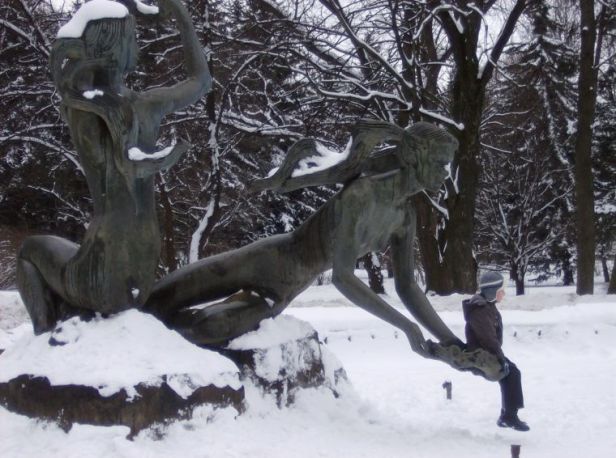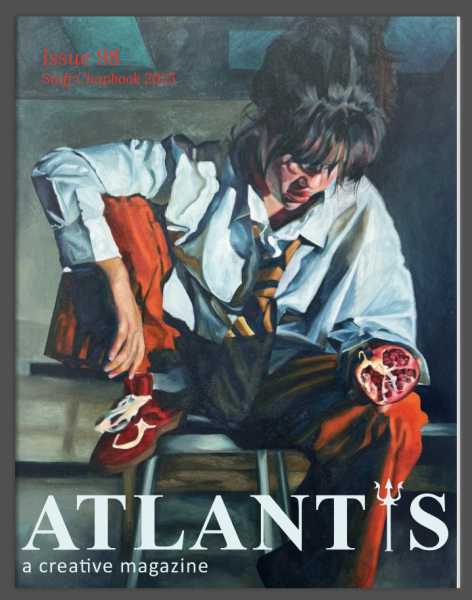Faculty talk about travel in closed-door countries
Cilano took this picture of a fountain on her first day in Belarus, at a park in Minsk. She and other faculty members shared their experiences in closed-door countries at a Big Read event hosted by Randall Library.
As part of The Big Read Greater Wilmington, UNC Wilmington’s William Randall Library hosted “Traveling Through Open and Closed Doors: Americans’ Perspective on Traveling Abroad” on Wednesday, Nov. 13. The event was a panel discussion with four UNCW faculty members who have spent time abroad in countries that have not always had a hospitable relationship with the United States.
“The Big Read is a national program designed to revitalize the role of literature in American culture and to encourage reading for pleasure and enlightenment,” said the initiative’s website. This year’s Greater Wilmington Big Read is Tim O’Brien’s “The Things They Carried.”
During the panel discussion, each speaker was asked to talk briefly about his or her time spent abroad. In keeping with the theme of this year’s book, each panelist was also asked to talk a little bit about the things they carried in foreign lands.
The speakers—Dana Sachs, Lisa Pollard, Cara Cilano and Bill Kawczynski—took the podium with the “The Things We Carried” exhibit as a backdrop. The exhibit is another part of The Big Read Greater Wilmington that showcases pictures of UNCW students, faculty and staff and their stories of the things they carried during service overseas.
Vietnam
Dana Sachs is a graduate of UNCW’s MFA creative writing program, and she is now a lecturer in the Honors College at UNCW. Sachs came to the panel as a self-proclaimed “evangelist for travel,” and promoted it as something that “expands your awareness and understanding of the world.”
During the event, Sachs talked about her travels to Vietnam. She grew up during the Vietnam War and remembers it only in flashes of smoky news clips. While traveling in Asia in the 1990s, Sachs decided to visit Vietnam and described this decision as a duty; “almost as if, if you were in Poland, you would go see Auschwitz.”
“Vietnam is a country. It’s not a war,” Sachs said. “It was a revelation to find out that it was this place where the culture and history was much richer than what I had thought it could be from my very narrow understanding [and] from having watched the war on TV when I was a kid.”
Sachs said the Southern Vietnamese were very friendly, treating their American visitors like “long lost cousins,” Sachs said.
Intrigued by the country, Sachs decided to return and live in Hanoi, the capital of North Vietnam, and teach English.
“The kind of experience I had in being able to convert something that was just imagery on television—which I witnessed as a child—into these human beings who have now been dear friends for decades, has been one of the most extraordinary experiences of my life,” Sachs said. “I think of the world in a really different way now.”
Egypt
Lisa Pollard is an associate professor and graduate coordinator in the Department of History. She is also the coordinator for the Middle East and Islamic studies minor.
In the early 1990s, Pollard received a Fulbright to spend time in Egypt, to do research for her dissertation. During this time, Pollard said the people were very warm and welcoming. Almost every conversation she had there “began and ended with their delight at my fluency in their language,” Pollard said.
“What I carried in the early 1990s was a sort of confidence that I could conquer the language, that I could conquer the archives,” she said.
But when Pollard went back in 2005, things in Egypt had changed, and every conversation revolved around Iraq and the United States’ invasion, Pollard said.
“I carried with me a real sense of sorrow that people had come to regard my country as a lover they couldn’t forgive or a friend who had truly betrayed them,” she said. “I was in much less physical danger in 2005 and 2006 than I had been in the 1990s, but I felt very much in 2005 and in 2006 that I was in enemy territory. Intimacy and storytelling just weren’t happening.”
Belarus
Cara Cilano said that she traveled to Belarus because she “wanted to see something intellectually.” As a researcher of post colonialism, she was interested in this former Soviet republic’s existence after the fall of communism and the Soviet Union.
“When I got to Minsk,” Cilano said, “the U.S. Embassy put me in a van and said that, if anything happened, they would send a Marine for me.”
Cilano describes the attitudes of the Belarusians as respectful and polite, but very “stand-offish.”
In their post-colonial state, Belarus had very sexualized views of femininity. Cilano remembers one particular experience, which took place on International Women’s Day: a bathing suit beauty contest for the female students, judged by the faculty and the provost of the university.
“They saw me as female in a way that didn’t fit with how they were defining femininity and that was difficult for me to handle,” Cilano said.
The World Over
Bill Kawczynski’s first drive to travel came from looking at his father’s postcards from all over the world. He has since traveled to over 50 countries at times when they were both pro and anti-United States.
Kawczynski is now the community partnership specialist in the Chancellor’s office. He began working at UNCW in 2012 after having been at Cape Fear Community College, serving as a workforce development coordinator. Before that, he served as the database manager, operations analyst and logistics coordinator for multi-national forces in Iraq.
“I realized that people outside of the U.S. identified Americans by the types of TV shows that they had access to,” Kawczynski said about international views of American tourists.
However, he said that during much of his time abroad, he tried to dispel these misconceptions.
Kawczynski claimed that what helped him most during his time abroad was the effort he made to get to know the native culture and learn phrases in the native language.
The things that he carried were the number for the U.S. Embassy, the number for where he was staying and Zippo lighters to barter.
“If you have blue jeans, Nikes or a Zippo lighter, you could barter for just about anything,” Kawczynski said.
Being in the military, Kawczynski knew not to carry certain things. He said he carried only one form of identification and his own memories.
In many places where he has traveled, he has made life-long friends. Kawczynski encourages anyone who gets the chance to go abroad to use that opportunity, because it is a life changing experience.
The Big Read is designed to “re-vitalize the roll of literature in American culture and to encourage reading for pleasure and enlightenment,” said first year engagement librarian, Lisa Coats.
Wilmington received a grant to develop reading programs, which create community wide and diverse activities such as book discussions, panels, art exhibits, lectures, film screenings, and theatrical, music and dance performances.
“Our goal is to encourage reading and participation by diverse audiences and lapse our reluctant readers,” Coats said.










